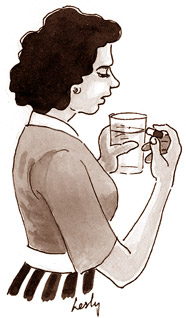New studies highlight risks of vitamin supplements
For years, we used same vitamins without
knowing the effects on the body
 New research is prompting a fresh look at the value of vitamin
supplements, with some surprising results indicating that taking too
many supplements of some could be harmful. New research is prompting a fresh look at the value of vitamin
supplements, with some surprising results indicating that taking too
many supplements of some could be harmful.
The research is forcing scientists to rethink the use of supplements
with antioxidants, which had been seen as beneficial in preventing
cancer, heart disease and other ailments.
“Everybody is confused,” admitted Toren Finkel, head of the Centre
for Molecular Medicine at the National Institutes of Health (NIH).
While logic would seem to dictate that taking vitamins and
antioxidants should help fight illness and disease, Finkel said in an
interview that the clinical data “are pretty consistently showing no
benefit.”
“So that means we have to go back and think about some of the
assumptions we have made along the way in terms of what the mechanism
for these diseases are and how things like oxidants play a role in those
diseases,” he told AFP.
Finkel explained that while it has long been believed that oxidants -
free radicals produced by the body or introduced through external
sources such as pollution - were unhealthy, the research paints a more
complex picture.
“You have to go back to the lab and try to design experiments you can
do a little simpler with cells or animals... to better understand the
role of oxidants and vitamins,” he said.
“For years, we were using these supplements without knowing the
effects on the body.”
A study published on October 11 in the United States indicates a 17
percent increase in the risk of developing prostate cancer among men who
take high doses of Vitamin E.
Another recent US study conducted among women and published on
October 10 revealed that multivitamins - commonly taken in the United
States - were useless and actually gradually contributed to a higher
risk of mortality.
As far back as 2007, researchers had established a link between
taking selenium supplements and an increased risk of adult diabetes.
For David Schardt, a nutritionist at the non-profit Center for
Science in the Public Interest, the problem is that “people think more
is better and that (supplements) are harmless.”
AFP |



